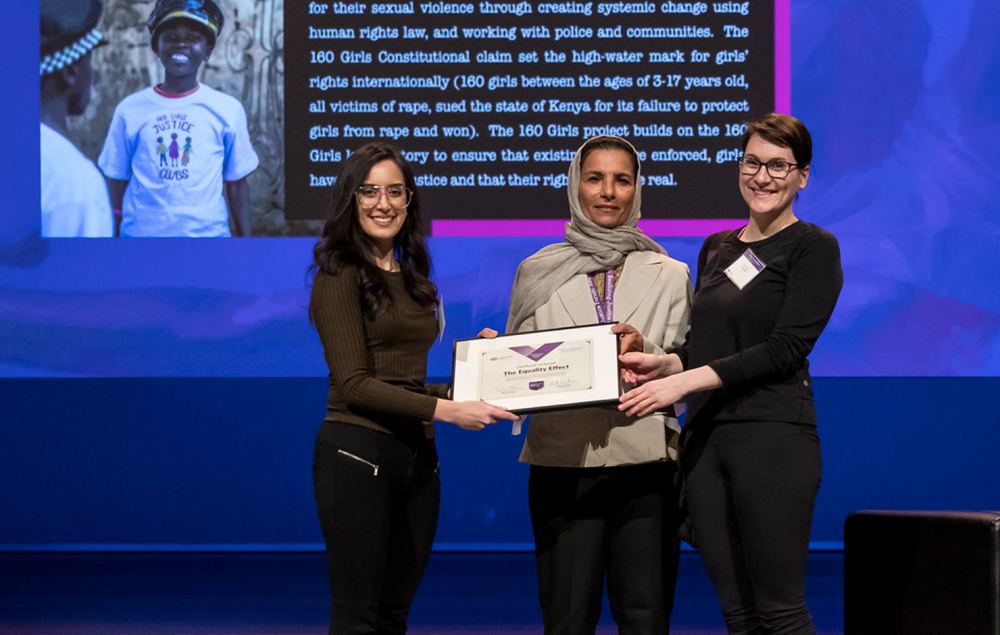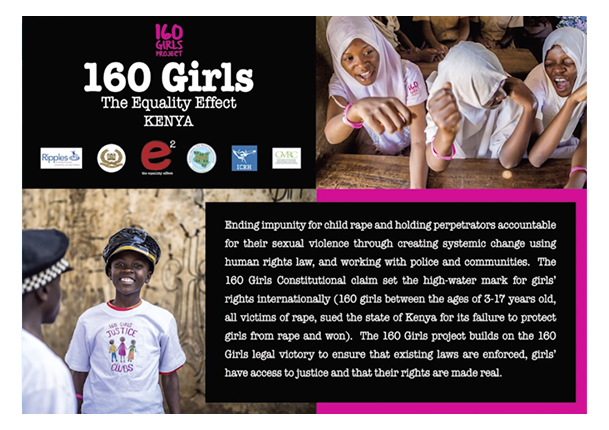

At the World Justice Forum: Realizing Justice for All, the World Justice Project was pleased to award five winners of the 2019 World Justice Challenge: Access to Justice Solutions—a competition to identify and highlight effective and promising work to increase access to justice.
Thirty finalists out of over 250 Challenge submissions were invited to present their projects in The Hague, where Forum participants and a panel of judges voted to select five awardees. The winning projects each received $10,000 USD prizes to further their goals and missions. These projects represent some of the best work being done globally to increase access to justice.

Over the next few weeks, we'll highlight winning World Justice Challenge projects in turn, providing direct insight into the access to justice needs being filled, project impacts, and how successes may be replicated in other parts of the world. This week, we discuss the Equality Effect's 160 Girls Access to Justice Project in Kenya, which is working to address a climate of impunity for sexual assault cases in a country where two-thirds of girls experience sexual assault.
Thank you to Fiona Sampson, CEO of the Equality Effect, for speaking with us about this work.
Can you describe the project in its most simple terms?
160 Girls is about achieving access to justice for girls who are rape victims, so as to end impunity for child rape, hold perpetrators accountable for their sexual violence, and reduce rape through deterrence.
Why was this project so necessary?
The 160 Girls project was so necessary because existing rape laws designed to protect girls from rape were not being enforced, and a climate of impunity for rape had resulted in unacceptable tolerance of child rape.
Can you tell us about the positive human impact the project has had?
As a result of 160 Girls, the police are now not just enforcing existing child rape laws, but providing international leadership with respect to child rape investigations and advancing girls’/children’s rights. The project has had a positive impact on all 10,000,000 girls in Kenya and beyond. Student leaders in the equality effect’s 160 Girls Justice Clubs describe 160 Girls as “a WOW experience,” highlighting the positive benefit of the project for the beneficiaries.
What has made this project so effective?
There are 5 main factors contributing to the 160 Girls success:
How can the approach of this project be applied in other parts of the world?
Impunity for rape is an international problem, and the 160 Girls approach is transferable to other parts of the world where a functional system of law and order exists to allow for ensuring accountability through the approach of combining human rights law, police engagement and community commitment to change.
What is next for this project?
160 Girls is scaling up in Kenya and we’ve initiated work in Malawi, and are exploring opportunities in other country contexts where invitations to partner have been extended.
How has the World Justice Forum and winning the World Justice Challenge helped your work?
The World Justice Forum and winning the World Justice Challenge has provided an invaluable endorsement of the 160 Girls project, serving to reinforce the importance of the need to hold perpetrators accountable for their sexual violence and ensure that girls are safe from the threat of rape. Winning the World Justice Challenge feels like the equivalent of a major judicial victory – a win in the court of public opinion, sending the message that access to justice for girls matters!
Is there anything else you want to add?
Thanks once again for the amazing honour of receiving the World Justice Project Access to Justice Award!
Learn more about the World Justice Challenge and all 30 finalists here, and watch the 2019 World Justice Challenge awards and more videos from the World Justice Forum: Realizing Justice for All here.